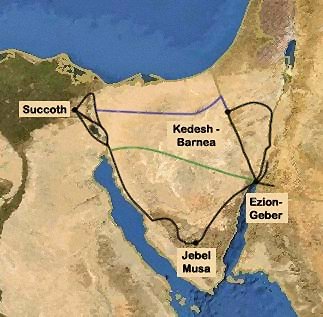Who Were the Pharaohs in Exodus?

Some Proposed Routes of the Exodus
In today’s commentary, LCG’s Adam West reported:
During the reign of Thutmose I, Hatshepsut, his daughter, pulled Moses from the Nile River. It is interesting that if you remove the “Thut” from Thutmose’s name, what remains is “mose.” This could simply be a coincidence, but this may be added proof of the timing of the succession of these kings and their biblical relevance.
After the death of Thutmose I, Thutmose II reigned in his place. Thutmose II was married to his half-sister, Hatshepsut (referred to as Thermuthis by Josephus, the Jewish historian (The Antiquities of the Jews, Book 2, Chap.9, Sect. 5, 224). When Thutmose II died, Thutmose III reigned with his mother at his side. Thutmose III, a son by the concubine of Thutmose II, was the new pharaoh.
Because Thutmose II and Hatshepsut had no male heirs, the son of a lesser wife was made heir. Hatshepsut was then appointed regent, due to Thutmose III being so young when he took to the throne. She later assumed total monarchal authority.
Moses, after being raised a prince in the courts of Thutmose I, II and III, fled after killing an Egyptian and hiding him in the sand (Exodus 2:12). He sought asylum, fleeing from Thutmose III who had sought to kill him, dwelling in the land of Midian. He was 40 years old.
Hatshepsut died leaving Thutmose III the sole ruler. Not long after her death in a violent reaction, he defaced the monuments of his stepmother. The immeasurable vitality of Thutmose III found another outlet – the pursuit of war. He carried out 17 successful military operations against the Syrians and those in Palestine. Yet, there happened another tragedy to the throne: his eldest son died, thus leaving another void in the line of a direct heir. Amenhotep II, the son of Thutmose III from a lesser wife, then was made co-ruler with his father. After three years Thutmose III died, leaving Amenhotep II to rule Egypt alone at the age of 18.
After 40 years of herding sheep, as well as an incredibly powerful encounter with God who spoke to him from a miraculous burning bush (Exodus 3:2-4), Moses returned to Egypt at God’s command. God reassured him that all the men who sought his life were now dead (Exodus 4:18-19). Amenhotep II was not yet born when Moses had fled to Midian.
When Moses, accompanied by Aaron, his spokesman, returned to Egypt, it was Amenhotep II whose heart God hardened (Exodus 4:21, et al.). Amenhotep II was many generations away from the pharaoh who ruled during Joseph’s time. Centuries had passed since Pharaoh made Joseph second in his kingdom only to himself (Genesis 41:39-41). “Now there arose a new king over Egypt, who did not know Joseph” (Exodus 1:8). Because of this, as well as the Israelite population explosion in Egypt, they were made slaves.
So, it was not Ramses II who, 430 years after Israel’s arrival in Egypt, was the pharaoh of the Exodus account, but rather Amenhotep II.
Historically, this is the eight days that began with the Passover and ended with the parting of the Red Sea. And from a New Testament perspective, this is the time period when Jesus took the Passover meal, was crucified, rose from the dead, ascended to His Father, and began a series of post-resurrection visits to His disciples.
Some articles of related interest may be include:
What Happened in the Crucifixion Week? How long are three days and three nights? Did Jesus die on “Good Friday”? Was the resurrection on Sunday? Do you really know? Who determined the date of Easter?
Is There “An Annual Worship Calendar” In the Bible? This paper provides a biblical and historical critique of several articles, including one by WCG which states that this should be a local decision. What do the Holy Days mean? Also you can click here for the calendar of Holy Days.
Hebrew Calendar This John Ogywn writing explains why we in the Living Church of God use the calendar that we do and answers such questions as “Did Jesus Observe the Postponements?”
Passover and the Early Church Did the early Christians observe Passover? What did Jesus and Paul teach? Why did Jesus die for our sins?
Melito’s Homily on the Passover This is one of the earliest Christian writings about the Passover. This also includes what Apollinaris wrote on the Passover as well.
The Night to Be Observed What is the night to be much observed? When is it? Why do Jews keep Passover twice and emphasize the wrong date?
Should Christians Keep the Days of Unleavened Bread? Do they have any use or meaning now? What is leaven? This article supplies some biblical answers.
Did Early Christians Celebrate Easter? If not, when did this happen? What do scholars and the Bible reveal?
 |
Tweet |
|